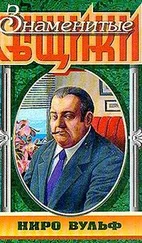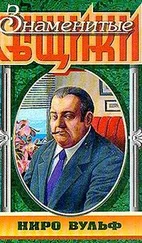Rex Stout
In the Best Families
It was nothing out of the ordinary that Mrs. Barry Rackham had made the appointment with her finger pressed to her lips. That is by no means an unusual gesture for people who find themselves in a situation where the best they can think of is to make arrangements to see Nero Wolfe.
With Mrs. Barry Rackham the shushing finger was only figurative, since she made the date speaking to me on the phone. It was in her voice, low and jerky, and also in the way she kept telling me how confidential it was, even after I solemnly assured her that we rarely notified the press when someone requested an appointment on business. At the end she told me once more that she would have preferred to speak to Mr. Wolfe himself, and I hung up and decided it rated a discreet routine check on a prospective client, starting with Mr. Mitchell at the bank and Lon Cohen at the Gazette . On the main point of interest; could she and did she pay her bills, the news was favorable: she was worth a good four million and maybe five. Calling it four, and assuming that Wolfe’s bill for services rendered would come to only half of it, that would be enough to pay my current salary — as Wolfe’s secretary, trusted assistant, and official gnat — for a hundred and sixty-seven years; and in addition to that, living as I did there in Wolfe’s house, I also got food and shelter. So I was fixed for life if it turned out that she needed two million bucks’ worth of detective work.
She might have at that, judging from the way she looked and acted at 11:05 the next morning, Friday, when the doorbell rang and I went to let her in. There was a man on the stoop with her, and after glancing quickly east and then west she brushed past him and darted inside, grabbed my sleeve, and told me in a loud whisper, “You’re not Nero Wolfe!”
Instantly she released me, seized the elbow of her companion to hurry him across the sill, and whispered at him explosively, “Come in and shut the door!” You might have thought she was a duchess diving into a hock shop.
Not that she was my idea of a duchess physically. As I attended to the door and got the man’s hat and topcoat hung on the rack, I took them in. She was a paradox — bony from the neck up and ample from the neck down. On her chin and jawbone and cheekbone the skin was stretched tight, but alongside her mouth and nose were tangles of wrinkles.
As I helped her off with her fur coat I told her, “Look, Mrs. Rackham. You came to consult Nero Wolfe, huh?”
“Yes,” she whispered. She nodded and said right out loud, “Of course.”
“Then you ought to stop trembling if you can. It makes Mr. Wolfe uneasy when a woman trembles because he thinks she’s going to be hysterical, and he might not listen to you. Take a deep breath and try to stop.”
“You were trembling all the way down here in the car,” the man said in a mild baritone.
“I was not!” she snapped. That settled, she turned to me. “This is my cousin, Calvin Leeds. He didn’t want me to come here, but I brought him along anyhow. Where’s Mr. Wolfe?”
I indicated the door to the office, went and opened it, and ushered them in.
I have never figured out Wolfe’s grounds for deciding whether or not to get to his feet when a woman enters his office. If they’re objective they’re too complicated for me, and if they’re subjective, I wouldn’t know where to start. This time he kept his seat behind his desk in the corner near a window, merely nodding and murmuring when I pronounced names. I thought for a second that Mrs. Rackham was standing gazing at him in reproach for his bad manners, but then I saw it was just surprised disbelief that he could be that big and fat. I’m so used to the quantity of him that I’m apt to forget how he must impress people seeing him for the first time.
He aimed a thumb at the red leather chair beyond the end of his desk and muttered at her, “Sit down, madam.”
She went and sat. I then did likewise, at my own desk, not far from Wolfe’s and at right angles to it. Calvin Leeds, the cousin, had sat twice, first on the couch toward the rear and then on a chair which I moved up for him. I would have guessed that both he and Mrs. Rackham had first seen the light about the same time as the twentieth century, but he could have been a little older. He had a lot of weather in his face with its tough-looking hide, his hair had been brown but was now more gray, and with his medium size and weight he looked and moved as if all his inside springs were still sound and lively. He had taken Wolfe in, and the surroundings too, and now his eyes were on his cousin.
Mrs. Rackham spoke to Wolfe. “You couldn’t very well go around finding out things. Could you?”
“I don’t know,” he said politely. “I haven’t tried for years, and I don’t intend to. Others go around for me.” He gestured at me. “Mr. Goodwin, of course, and others as required. You need someone to go around?”
“Yes.” She paused. Her mouth worked. “I think I do. Provided it can be done safely — I mean, without anyone knowing about it.” Her mouth worked some more. “I am bitterly ashamed — having at my age, for the first time in my life — having to go to a private detective with my personal affairs.”
“Then you shouldn’t have come,” Leeds said mildly.
“Then you have come too soon,” Wolfe told her.
“Too soon? Why?”
“You should have waited until it became so urgent or so intolerable that it would cause you no shame to ask for help, especially for one as expensive as me.” He shook his head. “Too soon. Come back if and when you must.”
“Hear that, Sarah?” Leeds asked, but not rubbing it in.
Ignoring him, she leaned forward and blurted at Wolfe, “No, I’m here now. I have to know! I have to know about my husband!”
Wolfe’s head jerked around to me, to give me a look intended to scorch. But I met his eye and told him emphatically, “No, sir. If it is, she fibbed. I told her we wouldn’t touch divorce or separation evidence, and she said it wasn’t.”
He left me and demanded, “Do you want your husband followed?”
“I... I don’t know. I don’t think so—”
“Do you suspect him of infidelity?”
“No! I don’t!”
Wolfe grunted, leaned back in his chair, squirmed to get comfortable, and muttered, “Tell me about it.”
Mrs. Rackham’s jaw started to quiver. She looked at Leeds. His brows went up, and he shook his head, not as a negative apparently, but merely leaving it to her. Wolfe let out a grunt. She moved her eyes to him and said plaintively, “I’m neurotic.”
“I am not,” Wolfe snapped, “a psychiatrist. I doubt if—”
She cut him off. “I’ve been neurotic as long as I can remember. I had no brother or sister and my mother died when I was three, and my father didn’t enjoy my company because I was ugly. When he died — I was twenty then — I cried all during the funeral service, not because he was dead but because I knew he wouldn’t have wanted me so close to him all that time — in the church and driving to the cemetery and there at the grave.”
Her jaw started to quiver again, but she clamped it and got control. “I’m telling you this because it’s no secret anyway, and I want you to understand why I must have help. I have never been sure exactly why my first husband married me, because he had money of his own and didn’t really need mine, but it wasn’t long until he hated looking at me just as my father had. So I—”
“That isn’t true, Sarah,” Calvin Leeds objected. “You imagined—”
“Bosh!” she quashed him. “I’m not that neurotic! So I got a divorce with his consent and gratitude, I think, though he was too polite to say so, and I hurried it through because I didn’t want him to know I was pregnant. Soon after the divorce my son was born, and that made complications, but I kept him — I kept him and he was mine until he went to war. He never showed the slightest sign of feeling about my looks the way my father and my husband had. He was never embarrassed about me. He liked being with me. Didn’t he, Calvin?”
Читать дальше












